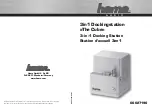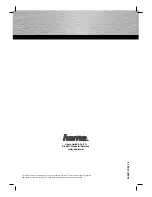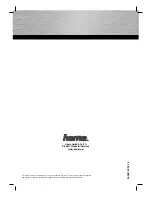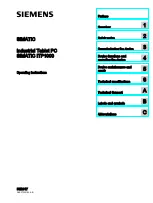
14
instructions for the basic set-up of remote temperature/humidity sensor units with the
WS-9043U
. These
extra sensors can be purchased through the same dealer as this unit, or by contacting La Crosse
Technology directly. A TX4U will monitor temperature and humidity, a TX6U will monitor temperature
only, a TX3U will monitor temperature and display the temperature on its LCD, and the TX3UP will
monitor the temperature via a probe for use in pools, spas, etc.
Note:
When setting up multiple units it is important to remove the batteries from all existing units in
operation, then to insert batteries first into all the remote temperature sensor units. Wait until the first
transmitter reception is received by the indoor weather station before inserting batteries into the next
transmitter and so forth. After all the transmitters reception is received, install batteries into the indoor
weather station. Transmission problems will arise if this is not done correctly and if the total time for
set-up exceeds 4 minutes.
A. SET-UP OF MULTIPLE UNITS
1. It is necessary to remove the batteries from all units currently in operation.
2. Remove the battery covers to all remote temperature/humidity sensor units.
3. Place all remote temperature/humidity sensor units in a numeric sequential order.
4. In sequential order, install batteries (follow the same battery installation procedures seen in
section
I. A)
of the
Detailed Set-Up
Guide).
5. Install batteries into the indoor weather station.
6. Follow the Detailed Set-Up Guide for programming and operating instructions.
B. VIEWING AND OPERATING WITH MULTIPLE REMOTE
TEMPERATURE/HUMIDITY SENSOR UNITS
1.
To view the temperature, humidity, heat index and dew point of a different remote
temperature sensor unit, press and release the
SNOOZE/CH
button. A shift from one “boxed”
number to the next should be observed in the OUTDOOR LCD.
2.
To view the Minimum/Maximum temperature, humidity, heat index and dew point: first
select which remote temperature/humidity sensor to read data from (indicated by the “boxed”
number), then press the
OUT
button. To view the readings from different transmitters, follow
IV. B.
Viewing the Outdoor Temperature/Humidity/Heat Index/ and Dew Records
paragraph above.
4.
To reset the Minimum/Maximum readings, select first which remote temperature/humidity
sensor to read data from. Press the
OUT
button to view the outdoor MIN/MAX records. Then
follow the steps in
IV. C. Resetting the Minimum and Maximum Records
paragraph
above.
MOUNTING
Note:
Before permanently mounting ensure that the indoor weather station is able to receive WWVB
signals from the desired location. Also, extreme and sudden changes in temperature will decrease the
accuracy of the indoor weather station, and changes in elevation will result with inaccurate weather
forecasting for the next 12 to 24 hours. These changes will require a 12 to 24 hour wait before obtaining
reliable data. To achieve a true temperature reading, avoid mounting where direct sunlight can reach the
remote temperature/humidity sensor or indoor weather station. While the remote temperature/humidity
sensor is weather proof, avoid submersion in water or snow. We recommend that you mount the remote
temperature/humidity sensor on an outside North-facing wall. The sending range is 330ft—obstacles
such as walls, concrete, and large metal objects can reduce the range. Place both units in their desired
location, and wait approximately 15 minutes before permanently mounting to ensure that there is proper
reception. The indoor weather station should display a temperature and humidity in the OUTDOOR
LCD within 4 minutes of setting up.
I.
THE REMOTE TEMPERATURE/HUMIDITY SENSOR





































